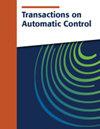Real-Time Distributed Model Predictive Control With Limited Communication Data Rates
IF 7
1区 计算机科学
Q1 AUTOMATION & CONTROL SYSTEMS
引用次数: 0
Abstract
The application of distributed model predictive controllers (DMPC) for multiagent systems (MASs) necessitates communication between agents, yet the consequence of communication data rates is typically overlooked. This work focuses on developing stability-guaranteed control methods for MASs with limited data rates. Initially, a distributed optimization algorithm with dynamic quantization is considered for solving the DMPC problem. Due to the limited data rate, the optimization process suffers from inexact iterations caused by quantization noise and premature termination, leading to suboptimal solutions. In response, we propose a novel real-time DMPC framework with a quantization refinement scheme that updates the quantization parameters on-line so that both the quantization noise and the optimization suboptimality decrease asymptotically. To facilitate the stability analysis, we treat the suboptimally controlled MAS, the quantization refinement scheme, and the optimization process as three interconnected subsystems. The cyclic-small-gain theorem is used to derive sufficient conditions on the quantization parameters for guaranteeing the stability of the system under a limited data rate. Finally, the proposed algorithm and theoretical findings are demonstrated in a multi-AUV formation control example.通信数据速率有限的实时分布式模型预测控制
分布式模型预测控制器(DMPC)在多智能体系统(MASs)中的应用需要智能体之间的通信,但通信数据速率的影响通常被忽视。本工作的重点是开发具有有限数据速率的质量的稳定保证控制方法。首先,考虑了一种动态量化的分布式优化算法来解决DMPC问题。由于数据速率的限制,优化过程受到量化噪声和过早终止引起的不精确迭代的影响,从而导致次优解。为此,我们提出了一种新的实时DMPC框架,该框架采用量化改进方案,在线更新量化参数,使量化噪声和优化次优性都渐近降低。为了便于稳定性分析,我们将次优控制MAS、量化细化方案和优化过程视为三个相互关联的子系统。利用周期小增益定理推导了在有限数据速率下保证系统稳定性的量化参数的充分条件。最后,通过多auv编队控制实例验证了本文提出的算法和理论成果。
本文章由计算机程序翻译,如有差异,请以英文原文为准。
求助全文
约1分钟内获得全文
求助全文
来源期刊

IEEE Transactions on Automatic Control
工程技术-工程:电子与电气
CiteScore
11.30
自引率
5.90%
发文量
824
审稿时长
9 months
期刊介绍:
In the IEEE Transactions on Automatic Control, the IEEE Control Systems Society publishes high-quality papers on the theory, design, and applications of control engineering. Two types of contributions are regularly considered:
1) Papers: Presentation of significant research, development, or application of control concepts.
2) Technical Notes and Correspondence: Brief technical notes, comments on published areas or established control topics, corrections to papers and notes published in the Transactions.
In addition, special papers (tutorials, surveys, and perspectives on the theory and applications of control systems topics) are solicited.
 求助内容:
求助内容: 应助结果提醒方式:
应助结果提醒方式:


